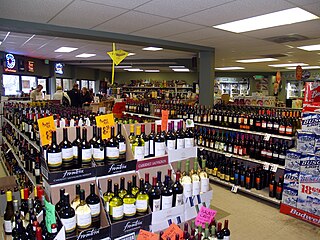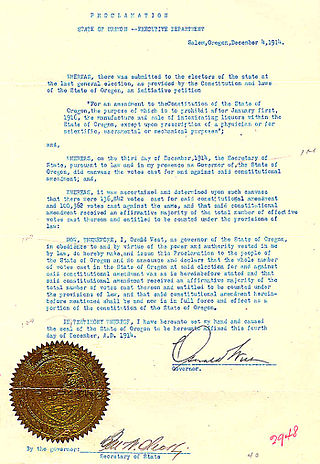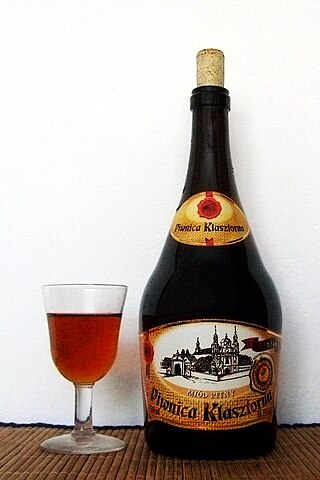Related Research Articles

Mead, also called hydromel, is an alcoholic beverage made by fermenting honey mixed with water, and sometimes with added ingredients such as fruits, spices, grains, or hops. The alcoholic content ranges from about 3.5% ABV to more than 20%. The defining characteristic of mead is that the majority of the beverage's fermentable sugar is derived from honey. It may be still, carbonated, or naturally sparkling; dry, semi-sweet, or sweet.

Fruit wines are fermented alcoholic beverages made from a variety of base ingredients ; they may also have additional flavors taken from fruits, flowers, and herbs. This definition is sometimes broadened to include any alcoholic fermented beverage except beer. For historical reasons, mead, cider, and perry are also excluded from the definition of fruit wine.

Beer in the United States is manufactured in breweries which range in size from industry giants to brew pubs and microbreweries. The United States produced 196 million barrels (23.0 GL) of beer in 2012, and consumes roughly 28 US gallons (110 L) of beer per capita annually. In 2011, the United States was ranked fifteenth in the world in per capita consumption, while total consumption was second only to China.

A liquor store is a retail business that predominantly sells prepackaged liquors, wine or beer, usually intended to be consumed off the store's premises. Depending on region and local idiom, they may also be called an off-licence, off-sale, bottle shop, bottle store or, colloquially, bottle-o, liquor store or other similar terms. A very limited number of jurisdictions have an alcohol monopoly. In US states that are alcoholic beverage control (ABC) states, the term ABC store may be used.

A meadery is a winery or brewery that produces honey wines or meads, and which sells them commercially. There are craft "meaderies" emerging all over North America, Canada, Australia and New Zealand where each meadery produces various styles of meads, such as fruit meads, traditional meads, session meads, and braggots.

A liquor license is a governmentally issued permit to sell, manufacture, store, or otherwise use alcoholic beverages.

A microdistillery is a small, often boutique-style distillery established to produce beverage grade spirit alcohol in relatively small quantities, usually done in single batches. While the term is most commonly used in the United States, micro-distilleries have been established in Europe for many years, either as small cognac distilleries supplying the larger cognac houses, or as distilleries of single malt whisky originally produced for the blended Scotch whisky market, but whose products are now sold as niche single malt brands. The more recent development of micro-distilleries can now also be seen in locations as diverse as London, Switzerland, and South Africa.

The production of wine in New Jersey has increased significantly in the last thirty years with the opening of new wineries. Beginning in 1981, the state legislature relaxed Prohibition-era restrictions and crafted new laws to facilitate the growth of the industry and provide new opportunities for winery licenses. Today, New Jersey wineries are crafting wines that have earned recognition for their quality from critics, industry leaders, and in national and international competitions. As of 2019, New Jersey currently has 51 licensed and operating wineries with several more prospective wineries in various stages of development.

The U.S. state of Oregon has an extensive history of laws regulating the sale and consumption of alcoholic beverages, dating back to 1844. It has been an alcoholic beverage control state, with the Oregon Liquor and Cannabis Commission holding a monopoly over the sale of all distilled beverages, since Prohibition. Today, there are thriving industries producing beer, wine, and liquor in the state. Alcohol may be purchased between 7 a.m. and 2:30 a.m for consumption at the premise it was sold at, or between 6 a.m. and 2:30 a.m. if it is bought and taken off premise. In 2020, Oregon began allowing the sale of alcohol via home delivery services. As of 2007, consumption of spirits was on the rise while beer consumption held steady. That same year, 11% of beer sold in Oregon was brewed in-state, the highest figure in the United States.

The state laws governing alcoholic drinks in New Jersey are among the most complex in the United States, with many peculiarities not found in other states' laws. They provide for 29 distinct liquor licenses granted to manufacturers, wholesalers, retailers, and for the public warehousing and transport of alcoholic drinks. General authority for the statutory and regulatory control of alcoholic drinks rests with the state government, particularly the Division of Alcoholic Beverage Control overseen by the state's Attorney General.

A caffeinated alcoholic drink is a drink that contains both alcohol and a significant amount of caffeine. Caffeine, a stimulant, masks some of the depressant effects of alcohol. However, in 2010 and 2011, this type of drink faced criticism for posing health risks to its drinkers. In some places there is a ban on caffeinated alcoholic drinks.
The production of beer in New Jersey has been in a state of recovery since Prohibition (1919-1933) and the Great Depression (1929-1945). Currently, the state has 123 licensed breweries: a large production brewery owned by an international beverage company, Anheuser-Busch InBev, and 122 independent microbreweries and 19 brewpubs. The growth of the microbreweries and brewpubs since the 1990s has been aided by the loosening of the state's licensing restrictions and strict alcohol control laws, many of which were a legacy of Prohibition.

The production of distilled spirits in New Jersey has not been a large industry in the state. Strict alcoholic beverage control laws in place during and after Prohibition (1919–1933) prevented the industry from growing for almost a century. In 2013, the state passed a law creating a craft distillery license. and issued the first new distillery license since Prohibition to Jersey Artisan Distilling.
The New Jersey Farm Winery Act was legislation passed by the New Jersey state legislature and signed by Governor Brendan Byrne in 1981. The Farm Winery Act was the first of several efforts by the New Jersey state legislature to relax Prohibition-era restrictions and craft new laws to facilitate the growth of the alcoholic beverage industry and provide new opportunities for winery licenses. Before it was enacted, New Jersey provided only one winery license for each million residents and licenses were practically impossible to obtain. By 1981, New Jersey boasted only seven wineries. By 1988, that number had doubled to 15. As of 2014, New Jersey currently has 48 licensed and operating wineries with several more prospective wineries in various stages of development. New Jersey wineries produce wine from more than 90 varieties of grapes, and from over 25 other fruits.
Rabbit's Foot Meadery was a meadery and winery in Sunnyvale, California, United States.

Dragonmead is a U.S. microbrewery, meadery and brewpub founded by Earl Scherbarth, Larry Channell, and Bill Wrobel in January 1997. The small brewery produces many varieties of beer, wine, and mead, and has received awards including gold medals at the World Beer Cup.

Superstition Meadery is a meadery, winery and cider house founded in 2012 and based in Prescott, Arizona. As of 2016 they produce 6,000 gallons a year. They won four gold medals and one silver at the 2016 Mazer Cup International mead competition. Availability is localized to Arizona through their distribution partnership with Hensley Beverage Company, with additional direct-to-consumer shipping in 40 U.S. states, and account distribution to 25 U.S. states. They also distribute worldwide in Denmark, Thailand, Japan, and Singapore.

Mead is an alcoholic beverage within Polish culinary tradition made by alcoholic fermentation of a mixture of honey and water. It has a characteristic honey aroma and a flavour that may be enriched by the addition of fruit juices, herbs or spices. The colour ranges from golden to dark amber, depending on the type of honey used for production.
References
- 1 2 3 4 American Producers are Making the Best Mead ‘the World Has Ever Known’. Wine Enthusiast, April 7, 2021.
- 1 2 3 What Is Mead?. Delish, August 15, 2019.
- ↑ This centuries-old drink isn’t just for Renaissance festivals anymore. Washington Post, November 6, 2015.
- 1 2 American Mead. Imbibe, June 13, 2003.
- ↑ Medieval No More: Mead Enjoys A Renaissance. NPR, May 1, 2011.
- 1 2 So Old It's New, Mead Enjoys a Renaissance. New York Times, February 7, 2012.
- ↑ About Us. American Mead Makers Association, accessed April 6, 2021.
- ↑ The American Mead Makers Association – Helping grow and guide the Mead Industry. Meadist, August 2, 2014.
- ↑ How Mead Is Making a Comeback. New Jersey Monthly, January 2020.
- 1 2 3 How the World's Oldest Booze Is Finally Becoming Cool. Thrillist, April 25, 2019.
- ↑ 7 Delicious Meads to Slake Your Thirst. Esquire, March 7, 2014.
- ↑ Mead, the honey-based brew producing a real buzz. CBS News, November 24, 2013.
- ↑ Making Mead in a Space Age World. The Atlantic , October 21, 2014.